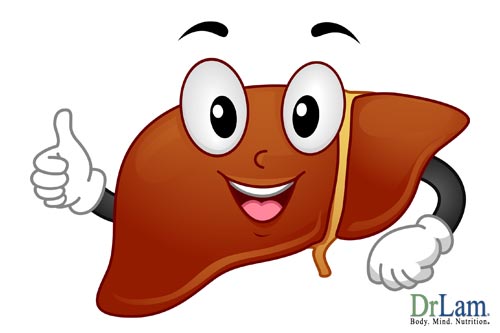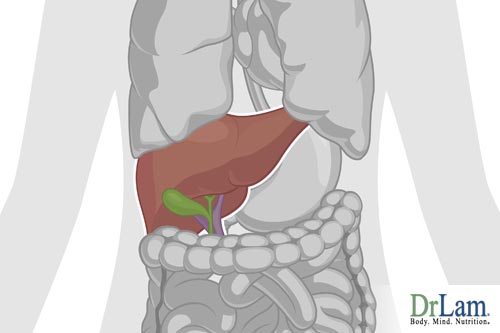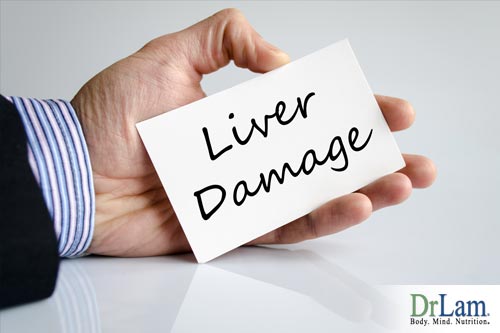 Adrenal function is part of a network of anatomical and metabolic structures and pathways, called the NeuroEndoMetabolic (NEM) stress response system, that interact in a dynamic flow. Alleviating dysfunction in the system therefore requires attention to all organs and functions involved. The liver is a major player in this dynamic, and one of the benefits when you improve liver function is actually a better mood. The liver is a major body organ that is constantly involved in multiple metabolic functions. When the liver is overloaded, as in Adrenal Fatigue Syndrome (AFS), many of these functions do not work optimally, affecting energy, mood, and feelings of pleasure and happiness. Having a “happy” liver really can contribute to feelings of well-being.
Adrenal function is part of a network of anatomical and metabolic structures and pathways, called the NeuroEndoMetabolic (NEM) stress response system, that interact in a dynamic flow. Alleviating dysfunction in the system therefore requires attention to all organs and functions involved. The liver is a major player in this dynamic, and one of the benefits when you improve liver function is actually a better mood. The liver is a major body organ that is constantly involved in multiple metabolic functions. When the liver is overloaded, as in Adrenal Fatigue Syndrome (AFS), many of these functions do not work optimally, affecting energy, mood, and feelings of pleasure and happiness. Having a “happy” liver really can contribute to feelings of well-being.
In those experiencing Adrenal Fatigue, stress can be especially overwhelming and can negatively affect the body considerably. Over time, adrenal function will decrease as the body’s nutritional reserves run low. At the same time, levels of toxins and metabolites increase due to a sluggish liver. The liver may be sluggish due to a concerted effort by the body to conserve energy and slow down the functioning of some organs, or the liver may simply be overwhelmed by the toxins and inflammatory compounds that accumulate when your body and adrenals lack the energy to deal with them properly.
Your liver does an amazing number of functions simultaneously.
 An overstressed and underactive liver may not produce red flags on conventional medical tests measuring liver function. Even if there are indications of liver trouble, the results are often overlooked when they are only slightly above or below normal range. This is true for tests of adrenal and thyroid function as well.
An overstressed and underactive liver may not produce red flags on conventional medical tests measuring liver function. Even if there are indications of liver trouble, the results are often overlooked when they are only slightly above or below normal range. This is true for tests of adrenal and thyroid function as well.
Health practitioners using the NEM model of Adrenal Fatigue look for symptoms of adrenal and liver overload that are considered sub-clinical by other doctors. They use more detailed examinations of symptoms and tests that measure metabolic changes over the course of the day. Symptoms indicating a need to improve liver function include:
The adrenals and liver work together to respond to stress and toxins of all kinds. As Adrenal Fatigue progresses, liver function lessens, resulting in a of decline of both systems. Recovery requires gentle and on-going support through changes in lifestyle, diet, nutritional supplementation, and modalities such as detoxification, when appropriate. It should be noted that when the body is completely overwhelmed—as is often the case in advanced Adrenal Fatigue—any attempt to detoxify the body risks a retoxification reaction, worsening the condition. Overcoming AFS involves treating the body as a whole and recognizing the central role played by the liver.
To improve liver function you must stop all sources of overload, including alcohol, cigarette smoke, caffeine and tannic acid, (both present in coffee and black tea), fried foods, hydrogenated oils, roasted nuts, and most animal protein. Refined and artificial sugars and refined food products, such as candy and pre-packaged foods, are also on the do-not-consume list. These foods stress the liver, where their components must be broken down.
Certain drugs and supplements can be harmful to the liver, especially during a period of detoxification. Iron supplements, also known as ferrous sulfate, contain an oxidant that can be abrasive to the liver in excess. The antibiotic tetracycline and some over-the-counter medications can also be stressful for the liver. Read package inserts, and if any medications you are taking have known negative side effects involving the liver, talk to your medical provider about possible alternative medications.
A healthy digestive system is also important to improving liver function. The liver needs to do something with the toxins and byproducts it is processing, and the bowels are an excellent way of disposing of this waste.
Eating generous amounts of high fiber foods and drinking lots of water are the best ways of moving the bowels regularly. Drinking adequate amounts of water is vital for liver health, and most people do not drink enough. On average, healthy men need about three liters of water every day. Women need about 2 liters. But, you may need considerably more than this, depending on health, exercise levels, and the climate where you live. To improve liver function, consider increasing the amount of water that you drink daily.
 Overcoming AFS involves seeing the body as a dynamic and interconnected set of anatomical structures and metabolic systems working together.
Overcoming AFS involves seeing the body as a dynamic and interconnected set of anatomical structures and metabolic systems working together.
When the adrenals become exhausted, the functioning of the liver is also affected. If the liver is already stressed from years of toxic exposure to alcohol, prescription medications, poor diet, and lack of exercise, the additional strain from the adrenals reduces liver function even further.
If you improve liver function by eliminating sources of stress, eating liver-healthy foods, drinking adequate water, getting moderate exercise, and making wise use of dietary supplements, your adrenals and liver can work together to restore health and happiness.
Bear in mind that a body suffering from Adrenal Fatigue is weak. Overaggressive detoxification or fortification of the liver may actually make the condition worse. In addition, what works for one person may backfire for another person. Always be very careful and consult an AFS-literate practitioner.
If your liver is unhealthy, then the rest of your body can't be healthy either. It's just as simple as that. Whether you have AFS or just want to improve your health overall, taking steps to improve liver function is a good idea. Here's what you need to know before you make these changes to your life:
If you'd like help to improve your liver health, then talk to our team on +1 (626) 571-1234 or click here to talk to a doctor.
© Copyright 2016-2020 Michael Lam, M.D. All Rights Reserved.
